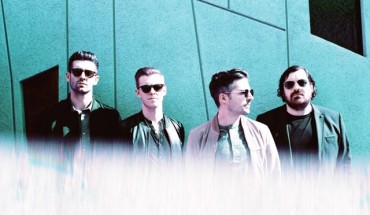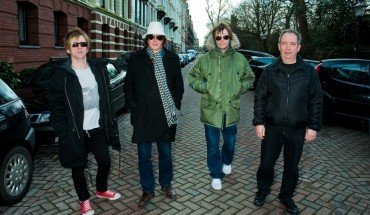Steve Diggle is co-founder of seminal Manchester punks Buzzcocks, progenitors of alternative indie culture and between 1976 – 1981 he authored hits of theirs such as ‘Promises’ and Harmony in my head’ before forming Flag of Convenience with ‘Cocks drummer John Maher. In 1989 Buzzcocks reconvened and became aware of the huge impact they had on bands across the globe with their influence permeating the sphere to this day. They have released nine studio albums, most recently 2014’s The Way.
Steve, never one to slow down, has also released three solo albums and is tapping into the zeitgeist by crowd-sourcing his new LP via Pledgemusic, offering numerous personal mementoes and artefacts as booty. The idiosyncratic debonair and raconteur opens up on punk lore and his role in it, the quirks of fate, boredom and its effects, music as transcendence, uses and abuse of technology, David Bowie, the state of music and more.
July 20th 2016 makes it 40 years since opening for Sex Pistols following the seminal first Free Trade Hall gig a month earlier. What are your recollections?
All those journalists went down to review the 2nd one, saw us and also put Pistols on the map in a big way, punk wasn’t just a London thing, also put the provinces on the map, other towns started to follow suit. The gig changed Manchester, kick-started what would happen later on.
You can’t plan that kind of stuff, but, our hearts and our souls were in the right place, we were thinking about a lot of the artistic things, the excitement and the rock and roll, and to wrap all that energy up in a song and by saying things in a certain way, it became a powerful package, it was very direct and instant. We were dealing with the human condition and touched a nerve with people, wasn’t just simply to be famous or to entertain people, we never thought about that.
You tapped into something that was bubbling under across the country and probably the world …
Absolutely, I had those feelings way before I met the others, there was definitely something in the air and I was looking for something myself thinking ‘Fuck, something’s got to happen’ but you didn’t know what it was going to be. It takes a while to search for things in the dark, but, if you point yourselves in the right direction, which we did somehow … at the time the music business was all sewn up, you couldn’t really question it or do anything, particularly in Manchester, you had to go and beg for deals.
This simply pulled the carpet from under the record companies and said ‘Fuck you, you fuckers, we’re having it here and we’re having it now, out on the streets’ and people related to that really quickly and the songs we had. Our first song ‘Boredom’ that was like a call to arms, people just identified with that right away and thought ‘Fuck, yeah we are fucking BORED’
Is it true that Malcom McLaren bumped into you at the first Free Trade Hall and told you the people you were looking for were upstairs (Devoto/Shelley)?
Yeah, I’d been playing with some other guys round the corner from me, so I went down to meet him at the Free Trade Hall, Malcolm McLaren was stood outside, he said ‘they’re inside here’ and I said I was supposed to meet someone outside and he said ‘No, they’re inside here’ and I thought ‘I don’t remember saying anything like that to this guy on the phone’ It was a proper Malcolm McLaren Situationist thing really, a really farcical set of circumstances, some things tallied with what I’d said on the phone other things didn’t, I thought ‘I don’t remember saying that’ and I’m sure he (Pete) felt the same. We kind of connected really and then from there we watched the Pistols and then the next day we all went to Howard’s house and all plugged into one amp and did the first rehearsal.
I remember him outside trying to ‘sell’ me the Sex Pistols, I’d heard of them, but, I wanted to do a group with 3 minute songs and smash guitars.
A chance to vent some anger?
Yeah, I wrote a song called ‘Fast Cars’ and a few others and thought ‘I need to look for a band’ and so I thought I’m rehearsing with these guys but I thought ‘they ain’t gonna make it, I thought I’ve got to get out there and meet other people, I knew LOTS of people, but more on the Manchester drinking scene!
A quirk of fate?
Yeah, like attracting to some magnet, we all gravitated towards each other in a way, and the person I was supposed to meet called me up and I said ‘Look, I’m going down to rehearse with these other guys I’ve met’ which became the Buzzcocks.
With ‘Fast Cars’ it’s one of the oldest eco-wary songs with the line ‘sooner or later you’re gonna listen to Ralph Nader’ or is it about Formula 1 (‘they’re so depressing, going round and round, ooh they make me dizzy’)?
Ralph Nader talked about the ecological stuff and their safety. I’d had this line and I said to Howard ‘how in Russia do you go by car’ because I’d read that something like 1:1,000,000 people had a car, and also on many levels of what it stands for, particularly in the 70s, if someone had an E-Type Jag they were a bit of a cunt! The symbol of some kind of wealth, you were kind of trained to see it as some kind of success, get a nice house and a car. It was symbolism for a lot of things for me. A lot of those people were dickheads, initially it started like that, the ‘hating’ of fast cars was a bit of a shock because everyone’s supposed to ‘like’ fast cars. The antithesis of hero-worship of that kind of thing.
And now you’ve got Clarkson and all those fucking people on that programme, they drive all those ridiculous cars of 100s of thousands of pounds, what fucking world’s that?!
Fake aspiration?
It’s another sign of the divide in this country, between the rich and the poor and the distribution of wealth. Any cunt that can spend £250,000 on a car could be buying a house for someone. You never see a family car on there, something of ‘value’.
Boredom used to be something you’d feed off and be inspired to create. The cultural theorist Mark Fisher has posited that ‘In today’s techno-netted society, is ‘boredom’ a thing of the past and been replaced by anxiety’.? How much would you agree with that?
It is a big philosophical question ‘boredom’ … almost goes back to the question ‘why are we here?’ like ‘what’s the point’, an existentialist question, how valid is anything; everything could be seen as boring if you take it to its logical conclusion. Is it all really a complete waste of time, is there any validity or importance in any of this, because like we see know now people running around killing each other, this planet’s floating round in space and there’s people like this. He (Fisher) has got a point.
I suppose boredom is something you try to alleviate by doing something, anxiety is a condition that is treated by prescription drugs which results in not doing anything?
It does seem a symptom of the modern society, ‘I’m bored, I’m depressed, I’ve got anxiety, here’s’ the tablets’ … in another way with the song, we were simply saying, ‘We’re fucking bored of the status quo, we’re bored of the situation’ that’s where it becomes a bit more philosophical in terms of what everything means, it becomes more universal than just anxiety, on every level.
That record, it instantly connected with people, it just told you everything in that one word, people were bored with things and with themselves.
‘Harmony in my head’ is a classic example of social observation.
When you look at a busy high street it’s quite chaotic and all I was saying ‘all this mess, look at life, look at the high streets where we all gather and its full of tragedy as much as happiness, that’s the music of life, no matter how down you are, how complicated life is there’s always tragedies, if you’re ever in doubt look at all these people. It’s just a chaotic cacophony of sound, there’s people dying every day, they can’t pay the bills, always something wrong, what do you expect, ‘this is life’, no one expects a perfect life or hopefully not a bad life. Looking at the herd and masses and going ‘That’s what it’s about’
A year before I was reading James Joyce’s Ulysses, which has this cinematic imagery and when you walk into a room you get input from everything; a lightbulb, from the floor, someone’s face, all these things at once, he didn’t write linear lines. The notion was ingenious to write all this fragmented stuff which we experience every moment, which has become more prevalent over the years. There’s even more input everywhere we go now, you’re hit by an million things at once everywhere.
1996’s Modern had your ‘Speed of Life’ and ‘Don’t let the car crash’, both Bowie-esque titles, were they inspired by him?
I’d forgotten ‘Speed of Life’, it was a little in-joke to me because I was taking a lot of speed at the time!
Britpop was underway, lots of crazy parties, hedonistic times, that notion of living your life, too busy to notice what you’re doing, don’t always stop and think ‘Who the fuck am I?’
‘Don’t let the car crash’ dates from when I was 17 I was in a car crash, my best mate died, we were all a bit drunk going down the road, we’d been thrown out of a club for dancing with each other, sure they were playing ‘Starman’! We got in and the car careered off the road, and I thought ‘Fuck, I’m gonna die’, was thrown about everywhere. we ended up in a garage and demolished the petrol pump, we could have all gone up in flames. When I got out my mate was on the floor, I thought he was ok, it seemed to take forever, he’d died. That changed my life a lot.
For me if you can walk down the street and you can see the sun then it’s all not that bad. It was like the Wild West in Camden at the time, that song came through running into those people, seeing casualties, lots of people thinking they were going to make it, their dreams becoming a nightmare.
Steve’s Pledgemusic site is at
Read part two HERE





